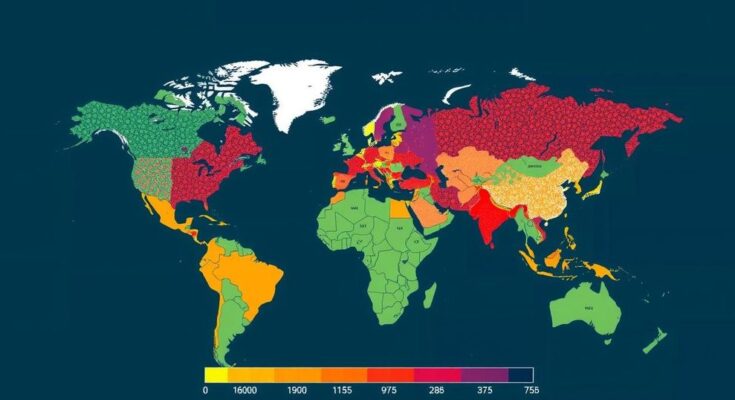The 2024 global election year has highlighted a troubling decline in commitment to climate action, as leaders skeptical of environmental policies gain ground amidst escalating climate disasters. Major victories for populist politicians, especially those denying climate crises, indicate a shift in priorities towards immediate economic concerns over environmental protection. This backdrop, compounded by stagnating climate negotiations, raises alarms about the future of global climate initiatives.
The global political landscape in 2024, termed by the United Nations as the “biggest election year in human history,” has revealed a stark trend: a decline in commitment to address the climate crisis among many nations. This year, despite the escalating frequency of climate-related disasters and record-breaking temperatures, the topic has receded into the background of electoral priorities. Major political victories for climate-skeptic leaders such as Donald Trump in the United States, right-wing parties in the European Union, and an empowered Vladimir Putin in Russia signal a worrying trend in global climate action. Climate expert Catherine Fieschi noted that despite the visible impacts of climate change, public prioritization of climate policy has weakened, particularly as the focus shifts to inflation, energy prices, and other immediate economic concerns.
The political shift away from aggressive climate action can be traced back to significant global disturbances, including the pandemic, geopolitical conflicts, and rising inflation. These events have contributed to a diminishing societal appetite for prioritizing the climate crisis. In the wake of Greta Thunberg’s earlier activism and ambitious green investment discussions, the current political narrative has markedly shifted from a focus on “green” initiatives to a more diluted emphasis on “clean” energy. The perception that climate activism brings economic threats has further stymied progress in many regions.
Despite environmental crises akin to what the world has never before witnessed, with anticipated record heat and natural disasters affecting several continents, political discourse around climate remains tenuous. Exceptions exist, such as citizen protests in India addressing agricultural devastation linked to extreme weather, but the overall narrative remains one of neglect. In the United States, Trump’s election further jeopardizes existing environmental regulations, while similar trends emerged in Europe where right-wing parties capitalized on criticisms of climate policy.
While some regions, such as the United Kingdom, saw progressive victories for climate action, the overarching narrative for this election year has been one of disillusionment with collective climate initiatives. The atmosphere surrounding the Cop29 climate summit exacerbated these concerns, as most world leaders chose to skip the conference, which took place in Azerbaijan, a country promoting its fossil fuel production. Leaders at the summit expressed frustration over the lack of significant progress toward emission reductions and financial commitments for vulnerable countries. Activists observed that the perennial focus on economic struggles and populist sentiments has derailed urgent climate discussions.
Nevertheless, there remains hope in the renewable energy sector’s growth, with projections indicating that oil consumption may soon peak. However, as political leaders falter in their commitments, the urgency of climate action is increasingly at risk. Political scientists argue that the risks associated with such populism can lead to the further sidelining of critical climate strategies and policies necessary to mitigate the impending climate crisis. The loss of time in acting against climate change continues to be a pressing concern, emphasizing the critical need for renewed focus and determination among global leaders.
The context for the decline in climate commitment stems from a convergence of significant global events that have shaped political priorities in 2024. Rising populism, exacerbated by the effects of the COVID-19 pandemic, economic instability, and armed conflicts in regions such as Ukraine and Gaza, have redirected public and governmental focus away from climate issues. The series of elections held worldwide has resulted in the election of leaders with skeptical views on climate science, omitting crucial climate conversations in favor of immediate economic concerns. This backdrop has triggered substantial shifts in climate policy perspectives, where economic arguments increasingly dominate over environmental imperatives.
The conclusions drawn from this election year illustrate a concerning trend of diminishing political will to address the climate crisis, despite ongoing environmental catastrophes. The election victories of right-leaning leaders who downplay climate action underscore a shift in public sentiment and political priorities. As significant climate conferences face neglect and global emissions continue to rise, the urgency for collaborative, effective climate action becomes increasingly critical. The emphasis on immediate economic challenges over climate commitments may jeopardize our ability to address the existential threat posed by climate change.
Original Source: www.theguardian.com




